Health Inequalities in New Zealand: Maori and Non-Maori Perspectives
VerifiedAdded on 2022/08/26
|6
|1515
|75
Essay
AI Summary
This essay delves into the health experiences of Maori and Non-Maori populations in New Zealand, highlighting significant disparities in health outcomes. It discusses the lower life expectancies and higher rates of various health issues, including diabetes and cervical cancer, among the Maori community. The paper attributes these disparities to factors such as lower education levels, limited access to healthcare services due to cost, and the impact of cultural and traditional values on health behaviors. The analysis incorporates insights from various research studies and literature, emphasizing the need for improved healthcare strategies, including cost-effective primary care and culturally sensitive interventions, to address health inequalities. The paper concludes by suggesting action plans, such as governmental initiatives and the involvement of NGOs, to bridge the health gap between the two groups, ensuring equitable access to healthcare and improved health outcomes for the Maori population.
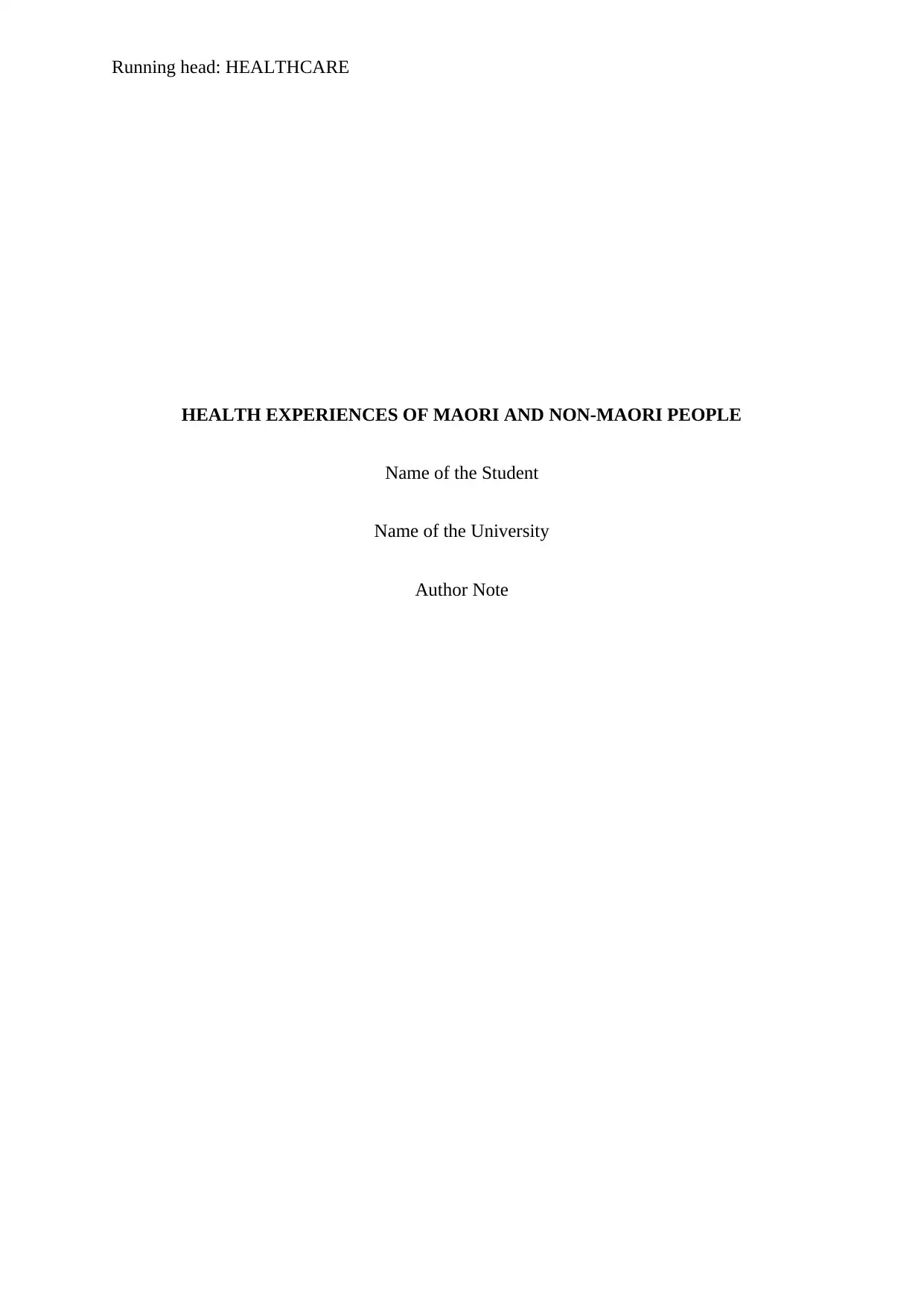
Running head: HEALTHCARE
HEALTH EXPERIENCES OF MAORI AND NON-MAORI PEOPLE
Name of the Student
Name of the University
Author Note
HEALTH EXPERIENCES OF MAORI AND NON-MAORI PEOPLE
Name of the Student
Name of the University
Author Note
Paraphrase This Document
Need a fresh take? Get an instant paraphrase of this document with our AI Paraphraser
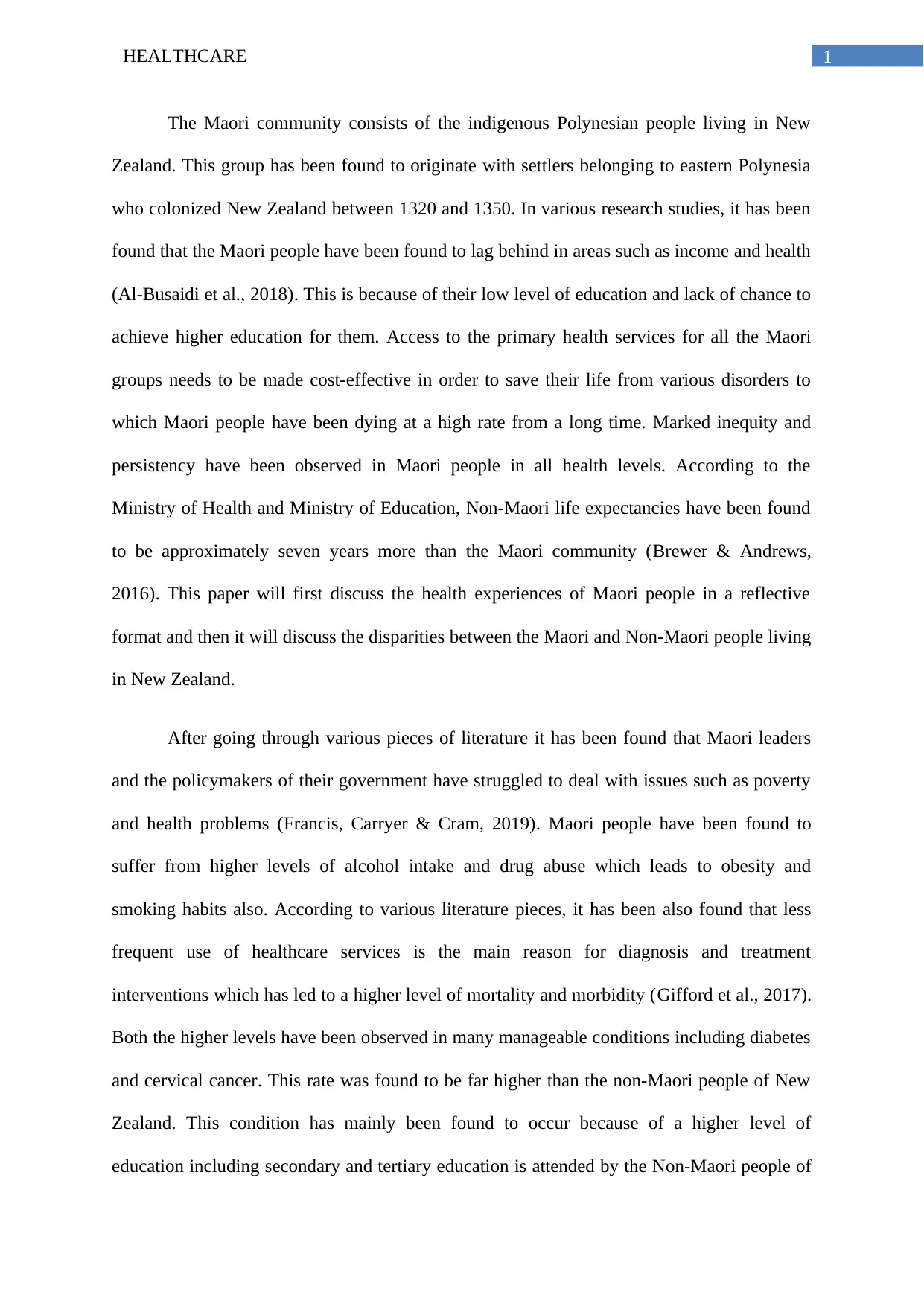
1HEALTHCARE
The Maori community consists of the indigenous Polynesian people living in New
Zealand. This group has been found to originate with settlers belonging to eastern Polynesia
who colonized New Zealand between 1320 and 1350. In various research studies, it has been
found that the Maori people have been found to lag behind in areas such as income and health
(Al-Busaidi et al., 2018). This is because of their low level of education and lack of chance to
achieve higher education for them. Access to the primary health services for all the Maori
groups needs to be made cost-effective in order to save their life from various disorders to
which Maori people have been dying at a high rate from a long time. Marked inequity and
persistency have been observed in Maori people in all health levels. According to the
Ministry of Health and Ministry of Education, Non-Maori life expectancies have been found
to be approximately seven years more than the Maori community (Brewer & Andrews,
2016). This paper will first discuss the health experiences of Maori people in a reflective
format and then it will discuss the disparities between the Maori and Non-Maori people living
in New Zealand.
After going through various pieces of literature it has been found that Maori leaders
and the policymakers of their government have struggled to deal with issues such as poverty
and health problems (Francis, Carryer & Cram, 2019). Maori people have been found to
suffer from higher levels of alcohol intake and drug abuse which leads to obesity and
smoking habits also. According to various literature pieces, it has been also found that less
frequent use of healthcare services is the main reason for diagnosis and treatment
interventions which has led to a higher level of mortality and morbidity (Gifford et al., 2017).
Both the higher levels have been observed in many manageable conditions including diabetes
and cervical cancer. This rate was found to be far higher than the non-Maori people of New
Zealand. This condition has mainly been found to occur because of a higher level of
education including secondary and tertiary education is attended by the Non-Maori people of
The Maori community consists of the indigenous Polynesian people living in New
Zealand. This group has been found to originate with settlers belonging to eastern Polynesia
who colonized New Zealand between 1320 and 1350. In various research studies, it has been
found that the Maori people have been found to lag behind in areas such as income and health
(Al-Busaidi et al., 2018). This is because of their low level of education and lack of chance to
achieve higher education for them. Access to the primary health services for all the Maori
groups needs to be made cost-effective in order to save their life from various disorders to
which Maori people have been dying at a high rate from a long time. Marked inequity and
persistency have been observed in Maori people in all health levels. According to the
Ministry of Health and Ministry of Education, Non-Maori life expectancies have been found
to be approximately seven years more than the Maori community (Brewer & Andrews,
2016). This paper will first discuss the health experiences of Maori people in a reflective
format and then it will discuss the disparities between the Maori and Non-Maori people living
in New Zealand.
After going through various pieces of literature it has been found that Maori leaders
and the policymakers of their government have struggled to deal with issues such as poverty
and health problems (Francis, Carryer & Cram, 2019). Maori people have been found to
suffer from higher levels of alcohol intake and drug abuse which leads to obesity and
smoking habits also. According to various literature pieces, it has been also found that less
frequent use of healthcare services is the main reason for diagnosis and treatment
interventions which has led to a higher level of mortality and morbidity (Gifford et al., 2017).
Both the higher levels have been observed in many manageable conditions including diabetes
and cervical cancer. This rate was found to be far higher than the non-Maori people of New
Zealand. This condition has mainly been found to occur because of a higher level of
education including secondary and tertiary education is attended by the Non-Maori people of
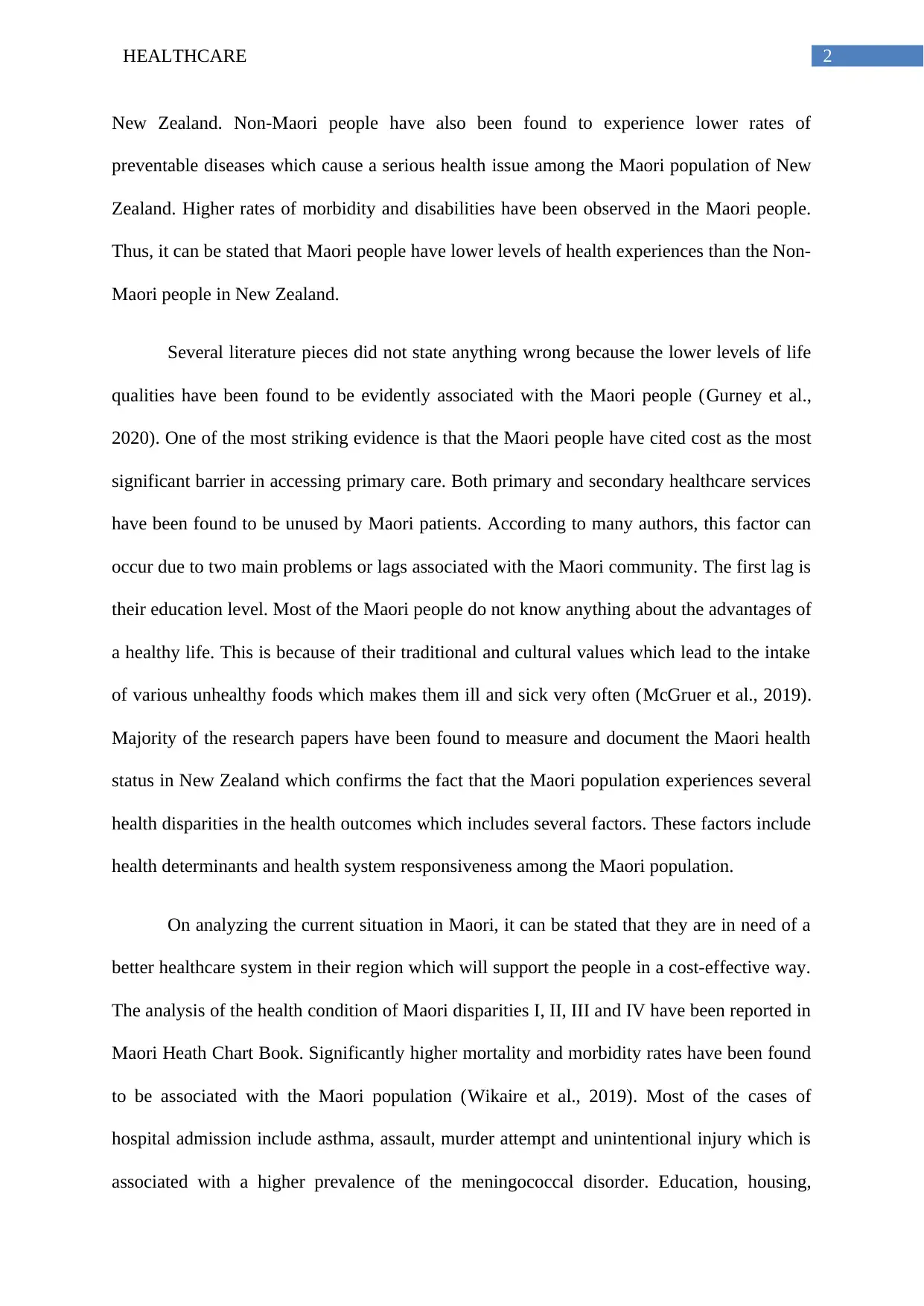
2HEALTHCARE
New Zealand. Non-Maori people have also been found to experience lower rates of
preventable diseases which cause a serious health issue among the Maori population of New
Zealand. Higher rates of morbidity and disabilities have been observed in the Maori people.
Thus, it can be stated that Maori people have lower levels of health experiences than the Non-
Maori people in New Zealand.
Several literature pieces did not state anything wrong because the lower levels of life
qualities have been found to be evidently associated with the Maori people (Gurney et al.,
2020). One of the most striking evidence is that the Maori people have cited cost as the most
significant barrier in accessing primary care. Both primary and secondary healthcare services
have been found to be unused by Maori patients. According to many authors, this factor can
occur due to two main problems or lags associated with the Maori community. The first lag is
their education level. Most of the Maori people do not know anything about the advantages of
a healthy life. This is because of their traditional and cultural values which lead to the intake
of various unhealthy foods which makes them ill and sick very often (McGruer et al., 2019).
Majority of the research papers have been found to measure and document the Maori health
status in New Zealand which confirms the fact that the Maori population experiences several
health disparities in the health outcomes which includes several factors. These factors include
health determinants and health system responsiveness among the Maori population.
On analyzing the current situation in Maori, it can be stated that they are in need of a
better healthcare system in their region which will support the people in a cost-effective way.
The analysis of the health condition of Maori disparities I, II, III and IV have been reported in
Maori Heath Chart Book. Significantly higher mortality and morbidity rates have been found
to be associated with the Maori population (Wikaire et al., 2019). Most of the cases of
hospital admission include asthma, assault, murder attempt and unintentional injury which is
associated with a higher prevalence of the meningococcal disorder. Education, housing,
New Zealand. Non-Maori people have also been found to experience lower rates of
preventable diseases which cause a serious health issue among the Maori population of New
Zealand. Higher rates of morbidity and disabilities have been observed in the Maori people.
Thus, it can be stated that Maori people have lower levels of health experiences than the Non-
Maori people in New Zealand.
Several literature pieces did not state anything wrong because the lower levels of life
qualities have been found to be evidently associated with the Maori people (Gurney et al.,
2020). One of the most striking evidence is that the Maori people have cited cost as the most
significant barrier in accessing primary care. Both primary and secondary healthcare services
have been found to be unused by Maori patients. According to many authors, this factor can
occur due to two main problems or lags associated with the Maori community. The first lag is
their education level. Most of the Maori people do not know anything about the advantages of
a healthy life. This is because of their traditional and cultural values which lead to the intake
of various unhealthy foods which makes them ill and sick very often (McGruer et al., 2019).
Majority of the research papers have been found to measure and document the Maori health
status in New Zealand which confirms the fact that the Maori population experiences several
health disparities in the health outcomes which includes several factors. These factors include
health determinants and health system responsiveness among the Maori population.
On analyzing the current situation in Maori, it can be stated that they are in need of a
better healthcare system in their region which will support the people in a cost-effective way.
The analysis of the health condition of Maori disparities I, II, III and IV have been reported in
Maori Heath Chart Book. Significantly higher mortality and morbidity rates have been found
to be associated with the Maori population (Wikaire et al., 2019). Most of the cases of
hospital admission include asthma, assault, murder attempt and unintentional injury which is
associated with a higher prevalence of the meningococcal disorder. Education, housing,
⊘ This is a preview!⊘
Do you want full access?
Subscribe today to unlock all pages.

Trusted by 1+ million students worldwide
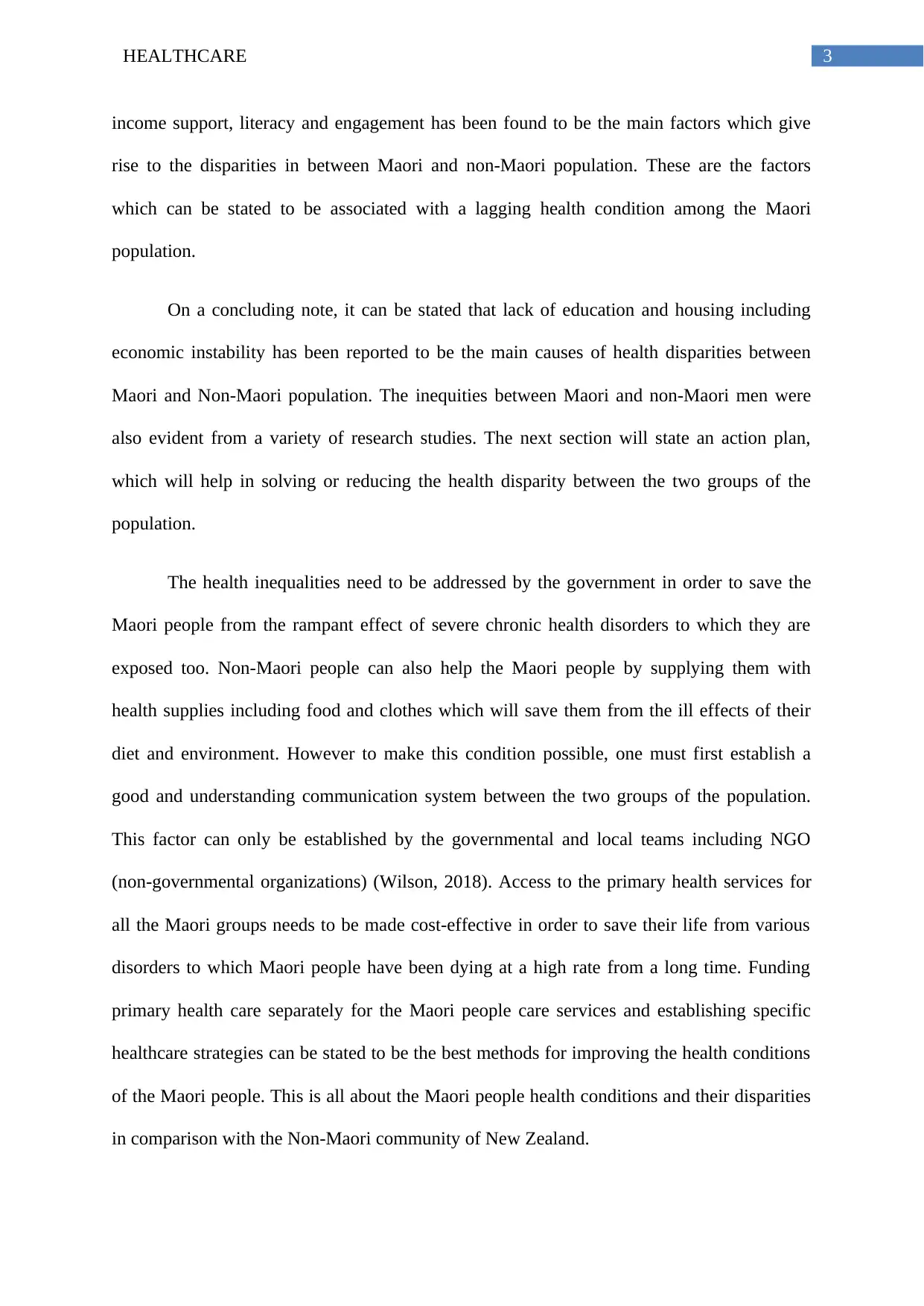
3HEALTHCARE
income support, literacy and engagement has been found to be the main factors which give
rise to the disparities in between Maori and non-Maori population. These are the factors
which can be stated to be associated with a lagging health condition among the Maori
population.
On a concluding note, it can be stated that lack of education and housing including
economic instability has been reported to be the main causes of health disparities between
Maori and Non-Maori population. The inequities between Maori and non-Maori men were
also evident from a variety of research studies. The next section will state an action plan,
which will help in solving or reducing the health disparity between the two groups of the
population.
The health inequalities need to be addressed by the government in order to save the
Maori people from the rampant effect of severe chronic health disorders to which they are
exposed too. Non-Maori people can also help the Maori people by supplying them with
health supplies including food and clothes which will save them from the ill effects of their
diet and environment. However to make this condition possible, one must first establish a
good and understanding communication system between the two groups of the population.
This factor can only be established by the governmental and local teams including NGO
(non-governmental organizations) (Wilson, 2018). Access to the primary health services for
all the Maori groups needs to be made cost-effective in order to save their life from various
disorders to which Maori people have been dying at a high rate from a long time. Funding
primary health care separately for the Maori people care services and establishing specific
healthcare strategies can be stated to be the best methods for improving the health conditions
of the Maori people. This is all about the Maori people health conditions and their disparities
in comparison with the Non-Maori community of New Zealand.
income support, literacy and engagement has been found to be the main factors which give
rise to the disparities in between Maori and non-Maori population. These are the factors
which can be stated to be associated with a lagging health condition among the Maori
population.
On a concluding note, it can be stated that lack of education and housing including
economic instability has been reported to be the main causes of health disparities between
Maori and Non-Maori population. The inequities between Maori and non-Maori men were
also evident from a variety of research studies. The next section will state an action plan,
which will help in solving or reducing the health disparity between the two groups of the
population.
The health inequalities need to be addressed by the government in order to save the
Maori people from the rampant effect of severe chronic health disorders to which they are
exposed too. Non-Maori people can also help the Maori people by supplying them with
health supplies including food and clothes which will save them from the ill effects of their
diet and environment. However to make this condition possible, one must first establish a
good and understanding communication system between the two groups of the population.
This factor can only be established by the governmental and local teams including NGO
(non-governmental organizations) (Wilson, 2018). Access to the primary health services for
all the Maori groups needs to be made cost-effective in order to save their life from various
disorders to which Maori people have been dying at a high rate from a long time. Funding
primary health care separately for the Maori people care services and establishing specific
healthcare strategies can be stated to be the best methods for improving the health conditions
of the Maori people. This is all about the Maori people health conditions and their disparities
in comparison with the Non-Maori community of New Zealand.
Paraphrase This Document
Need a fresh take? Get an instant paraphrase of this document with our AI Paraphraser
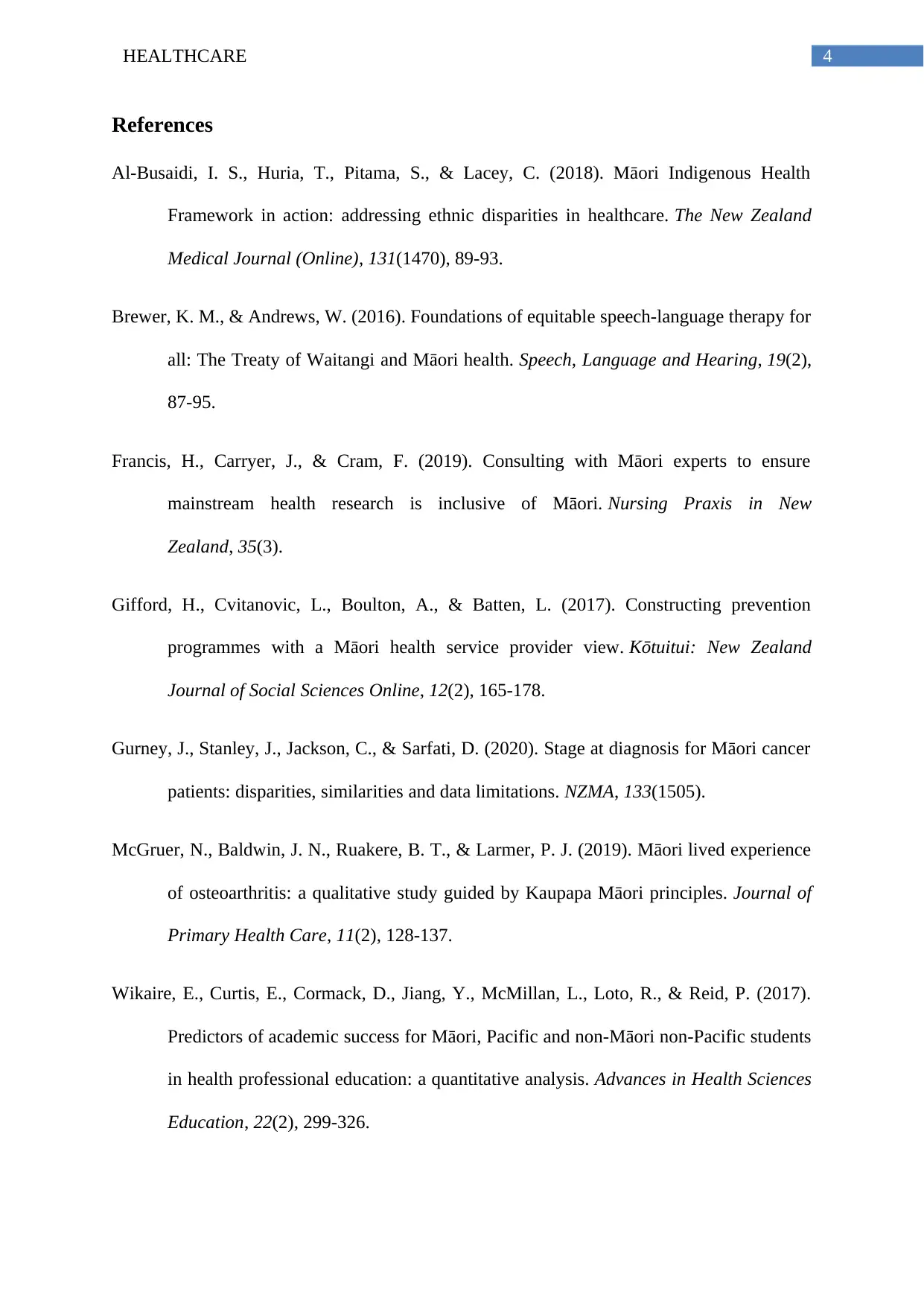
4HEALTHCARE
References
Al-Busaidi, I. S., Huria, T., Pitama, S., & Lacey, C. (2018). Māori Indigenous Health
Framework in action: addressing ethnic disparities in healthcare. The New Zealand
Medical Journal (Online), 131(1470), 89-93.
Brewer, K. M., & Andrews, W. (2016). Foundations of equitable speech-language therapy for
all: The Treaty of Waitangi and Māori health. Speech, Language and Hearing, 19(2),
87-95.
Francis, H., Carryer, J., & Cram, F. (2019). Consulting with Māori experts to ensure
mainstream health research is inclusive of Māori. Nursing Praxis in New
Zealand, 35(3).
Gifford, H., Cvitanovic, L., Boulton, A., & Batten, L. (2017). Constructing prevention
programmes with a Māori health service provider view. Kōtuitui: New Zealand
Journal of Social Sciences Online, 12(2), 165-178.
Gurney, J., Stanley, J., Jackson, C., & Sarfati, D. (2020). Stage at diagnosis for Māori cancer
patients: disparities, similarities and data limitations. NZMA, 133(1505).
McGruer, N., Baldwin, J. N., Ruakere, B. T., & Larmer, P. J. (2019). Māori lived experience
of osteoarthritis: a qualitative study guided by Kaupapa Māori principles. Journal of
Primary Health Care, 11(2), 128-137.
Wikaire, E., Curtis, E., Cormack, D., Jiang, Y., McMillan, L., Loto, R., & Reid, P. (2017).
Predictors of academic success for Māori, Pacific and non-Māori non-Pacific students
in health professional education: a quantitative analysis. Advances in Health Sciences
Education, 22(2), 299-326.
References
Al-Busaidi, I. S., Huria, T., Pitama, S., & Lacey, C. (2018). Māori Indigenous Health
Framework in action: addressing ethnic disparities in healthcare. The New Zealand
Medical Journal (Online), 131(1470), 89-93.
Brewer, K. M., & Andrews, W. (2016). Foundations of equitable speech-language therapy for
all: The Treaty of Waitangi and Māori health. Speech, Language and Hearing, 19(2),
87-95.
Francis, H., Carryer, J., & Cram, F. (2019). Consulting with Māori experts to ensure
mainstream health research is inclusive of Māori. Nursing Praxis in New
Zealand, 35(3).
Gifford, H., Cvitanovic, L., Boulton, A., & Batten, L. (2017). Constructing prevention
programmes with a Māori health service provider view. Kōtuitui: New Zealand
Journal of Social Sciences Online, 12(2), 165-178.
Gurney, J., Stanley, J., Jackson, C., & Sarfati, D. (2020). Stage at diagnosis for Māori cancer
patients: disparities, similarities and data limitations. NZMA, 133(1505).
McGruer, N., Baldwin, J. N., Ruakere, B. T., & Larmer, P. J. (2019). Māori lived experience
of osteoarthritis: a qualitative study guided by Kaupapa Māori principles. Journal of
Primary Health Care, 11(2), 128-137.
Wikaire, E., Curtis, E., Cormack, D., Jiang, Y., McMillan, L., Loto, R., & Reid, P. (2017).
Predictors of academic success for Māori, Pacific and non-Māori non-Pacific students
in health professional education: a quantitative analysis. Advances in Health Sciences
Education, 22(2), 299-326.

5HEALTHCARE
Wilson, D. (2018). Why do we need more Māori nurses?. Kai Tiaki: Nursing New
Zealand, 24(4), 2-2.
Wilson, D. (2018). Why do we need more Māori nurses?. Kai Tiaki: Nursing New
Zealand, 24(4), 2-2.
⊘ This is a preview!⊘
Do you want full access?
Subscribe today to unlock all pages.

Trusted by 1+ million students worldwide
1 out of 6
Related Documents
Your All-in-One AI-Powered Toolkit for Academic Success.
+13062052269
info@desklib.com
Available 24*7 on WhatsApp / Email
![[object Object]](/_next/static/media/star-bottom.7253800d.svg)
Unlock your academic potential
Copyright © 2020–2026 A2Z Services. All Rights Reserved. Developed and managed by ZUCOL.





